Election 2015: SNP wins 56 of 59 seats in Scots landslide
- Published
BBC Scotland's Andrew Kerr rounds-up the winners and losers in the general election in Scotland
The SNP has recorded a historic landslide general election victory in Scotland, winning 56 out of 59 seats.
Labour has been left with just one MP north of the border, but its Scottish leader Jim Murphy, who lost his seat, said he would continue in his post.
The Liberal Democrats lost 10 seats with only Alistair Carmichael holding on in Orkney and Shetland.
The Conservatives held Dumfriesshire, Clydesdale and Tweeddale - the other seat to withstand the SNP tsunami.
The headlines of the night were:
Results across Scotland saw the SNP win 50 seats, Labour lose 40 and the Lib Dems lose 10
the SNP won a 50% share of the vote in Scotland, Labour won just 24.3%
the SNP won all seven seats in Glasgow with the country's biggest swing - 39.3% from Labour - in Glasgow North East;
the SNP also took every seat in Tayside, all six seats in the north east of Scotland, made huge gains in Edinburgh and Fife and wiped out the Lib Dems in the Highlands and Islands
massive Labour losses including Scottish leader Jim Murphy who has vowed to fight on
the one Labour seat to be won in Scotland belonged to Ian Murray in Edinburgh South
the Scottish Conservatives hold their only seat in the south of Scotland
police probe possible allegations of fraudulent voting at three Scottish counts
see live coverage of the results and reaction to the SNP victory
The scale of the SNP's rout of Labour is unprecedented.
It won by 10,000 votes in Kirkcaldy and Cowdenbeath, which had previously been held by former UK Prime Minister Gordon Brown.
In East Renfrewshire, the SNP's Kirsten Oswald defeated Mr Murphy - who had been defending a majority of 10,400 - by 3,718 votes.

How has Scotland's political map changed?
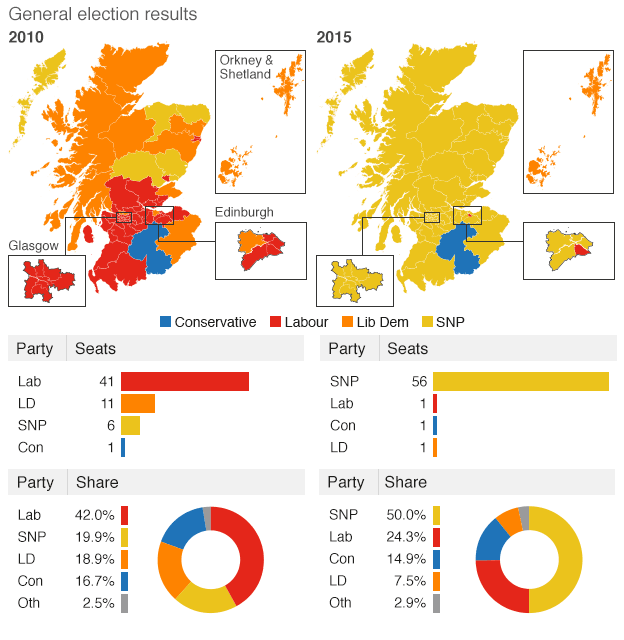
The SNP has won 56 seats, the Tories, Lib Dems and Labour have just one each. That sees Scotland's political map changed from a distinctive red/orange to a widespread yellow.

Despite former Labour MP Ian Davidson - who lost his Glasgow South West seat to the SNP's Christopher Stephens - calling for Mr Murphy to resign he told a news conference on Friday morning that he would "continue the fight".
Mhairi Black, who becomes the UK's youngest MP at the age of 20, overturned former shadow foreign secretary Douglas Alexander's majority of 16,600 in Paisley and Renfrewshire South to win by 5,684 votes - a swing of 27% from Labour to the SNP.
The SNP also gained Edinburgh South West, which had previously been held by Labour's former Chancellor Alistair Darling.
Labour's former Shadow Scottish Secretary Margaret Curran was defeated by more than 10,000 votes by the SNP's Natalie McGarry in Glasgow East.

Analysis by Brian Taylor, BBC Scotland political editor
In the aftermath of the referendum, folk in Scotland have been in a mindset which was focused upon the need for a clear Scottish voice.
That demand is inchoate and imprecise - in that it is not pegged directly or solely to a demand for particular devolved powers or a particular economic strategy.
It is, nevertheless, powerful and all-consuming. Perhaps all the more potent in that it is wide-ranging, rather than narrowly driven.
It is an aggregate feeling of remoteness from the concerns of a metropolitan elite, a feeling of physical and cultural distance from the Westminster centre of UK political life. A shout of anger, a yell of anguish, a demand to be heard.
And that feeling found expression through the SNP. Nicola Sturgeon is right. It tells us nothing about independence - other than the fact that the people of Scotland were not seemingly scared to endorse a party whose reason for being is to end the Union.

Alan Brown was elected as the new SNP MP for Kilmarnock and Loudoun - which was the first seat in Scotland to declare - with 30,000 votes. over Labour's Cathy Jamieson who polled 16,362 votes.
SNP leader Nicola Sturgeon, who is now in London for VE Day commemorations, said she had hoped her party would do well but "never in my wildest dreams would I have imagined we'd win 56 out of Scotland's 59 MPs".
"The tectonic plates of Scottish politics shifted yesterday - it is a historic result," she said.
Ms Sturgeon told the BBC: "Given that we are, unfortunately, facing another Conservative government, it's all the more important that we've got a strong team of SNP MPs standing up for Scotland.
"The government at Westminster cannot ignore what has happened in Scotland, people have voted overwhelmingly for Scotland's voice to be heard and for an end to austerity."
Nicola Sturgeon: "The tectonic plates of Scottish politics shifted yesterday"
She added: "We will go to Westminster and seek to ensure that Westminster governments can't ignore Scotland, that they can't simply push aside the things that were voted for in Scotland yesterday."
Throughout the election campaign, Ms Sturgeon had been hoping to form a "progressive alliance" with other parties to bring about change at Westminster.
But with the Conservatives having won a majority at Westminster, she insisted Labour could not blame her party for its failure to win across the UK.
Ed Miliband, who has resigned as UK Labour leader in the wake of the loss, said his party had been "overwhelmed" by a "surge of nationalism" in Scotland.
Mr Miliband added: "I also want to say that the next government has a huge responsibility in facing the difficult task in keeping our country together.
"Whatever party we come from, if we believe in the UK we should stand up for people in every part of our United Kingdom. Because I believe what unites us is much, much more than what divides us."
Speaking in Downing Street after winning an outright majority, Prime Minister David Mr Cameron said the Conservatives would "govern as a party of one nation".
Labour's leader in Scotland, Jim Murphy: ''We make no excuses''
He said new powers promised to Scotland before the referendum would be delivered, creating the "strongest devolved government anywhere in the world".
Liberal Democrat leader Nick Clegg also stood down after his party's disastrous showing across the UK, with 10 losses to the SNP in Scotland.
Former Liberal Democrat leader Charles Kennedy lost his Ross, Skye and Lochaber seat to the SNP's Ian Black ford. Mr Kennedy had held the seat for 32 years.
And former Lib Dem Chief Secretary to the Treasury Danny Alexander lost by more than 10,000 votes to Drew Hendry of the SNP in Inverness, Nairn, Badenoch and Strathspey.
The SNP's John Nicolson also defeated Lib Dem incumbent Jo Swinson in Dunbartonshire East
'Lion roaring'
The results mean that the SNP has recorded its most successful general election ever. Its previous best was in October 1974, when it won 11 seats. The party won six seats in 2010.
Among its new MPs is former party leader Alex Salmond who will be returning to the House of Commons after winning the Gordon constituency from the Liberal Democrats.
Mr Salmond, who served as an MP between 1987 and 2010, said: "There's going to be a lion roaring tonight, a Scottish lion, and it's going to roar with a voice that no government of whatever political complexion is going to be able to ignore.
"I think it's going to be a resounding voice, a clear voice, a united voice from Scotland, and I think that is a very good thing".
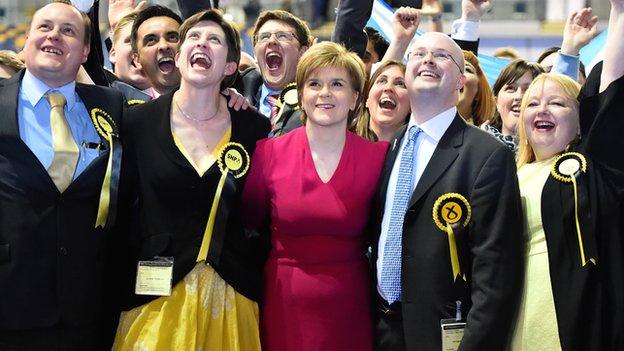
Ms Sturgeon has arrived at the Glasgow count, where the SNP has won all seven seats
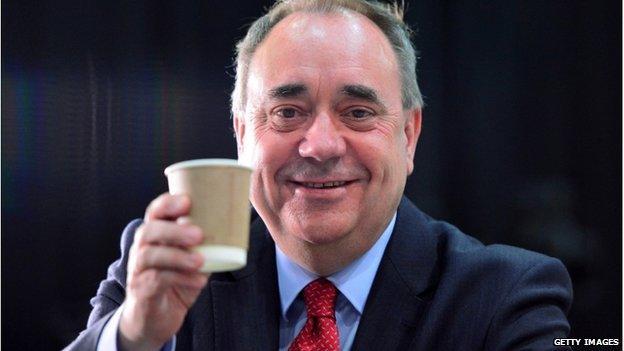
Alex Salmond will be returning to Westminster after winning in Gordon
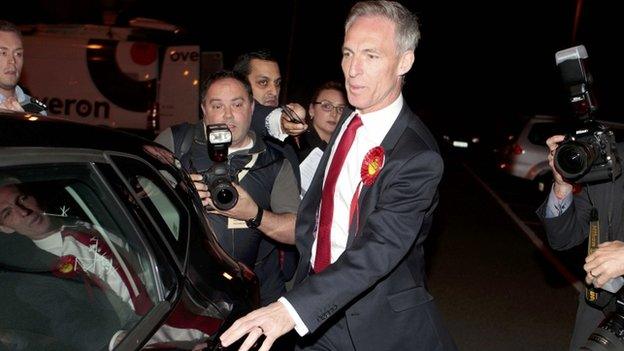
Jim Murphy is facing calls to resign as Scottish Labour leader after losing his East Renfrewshire seat to the SNP
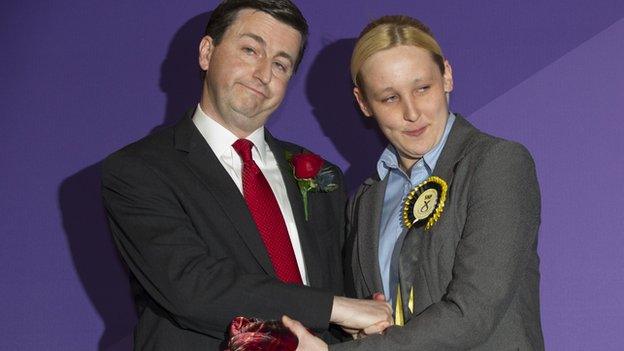
Mhairi Black has become the UK's youngest MP at the age of 20 after defeating Douglas Alexander
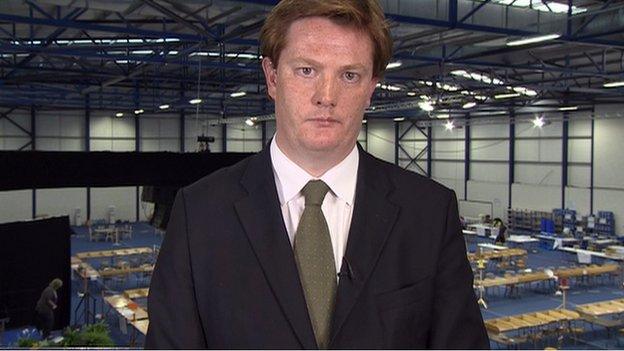
Danny Alexander was one of the big names to lose his seat

Analysis by James Cook, Scotland correspondent
David Cameron is back in Downing Street but at what price?
Has the Conservative prime minister sacrificed the union for another five years of power?
These are the questions many people are asking today after a party which fought for independence for 80 years swept to victory in Scotland.
The answer from the jubilant leader of the Scottish National Party, Nicola Sturgeon, is "no", this does not advance her cause.
She insisted that her MPs would speak for all of Scotland — not just for the 45% who voted for the country to leave the United Kingdom last September.
"This changes nothing," Ms Sturgeon told me when I asked her about independence at the count in Glasgow, in a brief moment of calm during the nationalist avalanche.

- Published8 May 2015

- Published8 May 2015
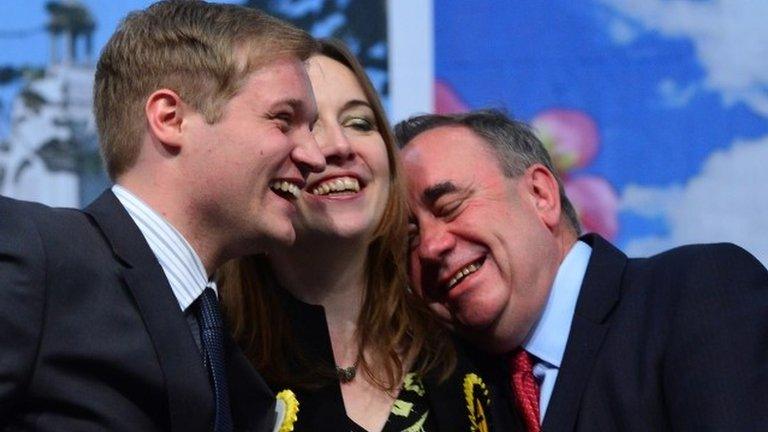
- Published8 May 2015
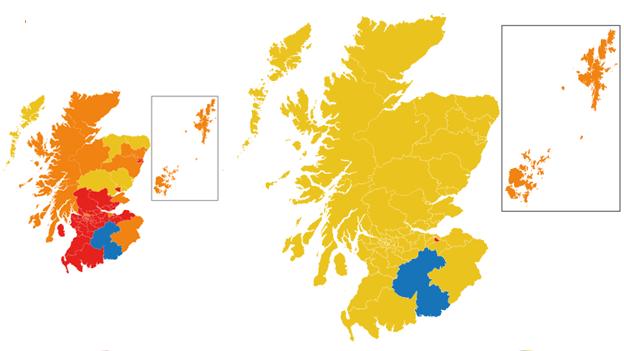
- Published8 May 2015
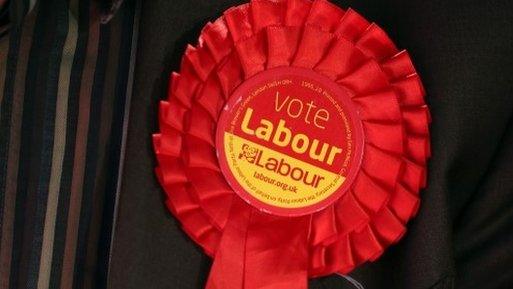
- Published8 May 2015
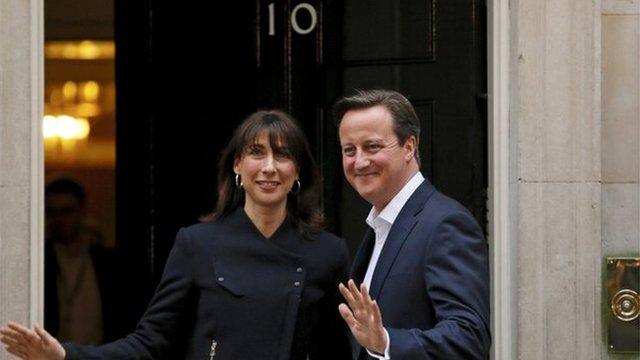
- Published8 May 2015
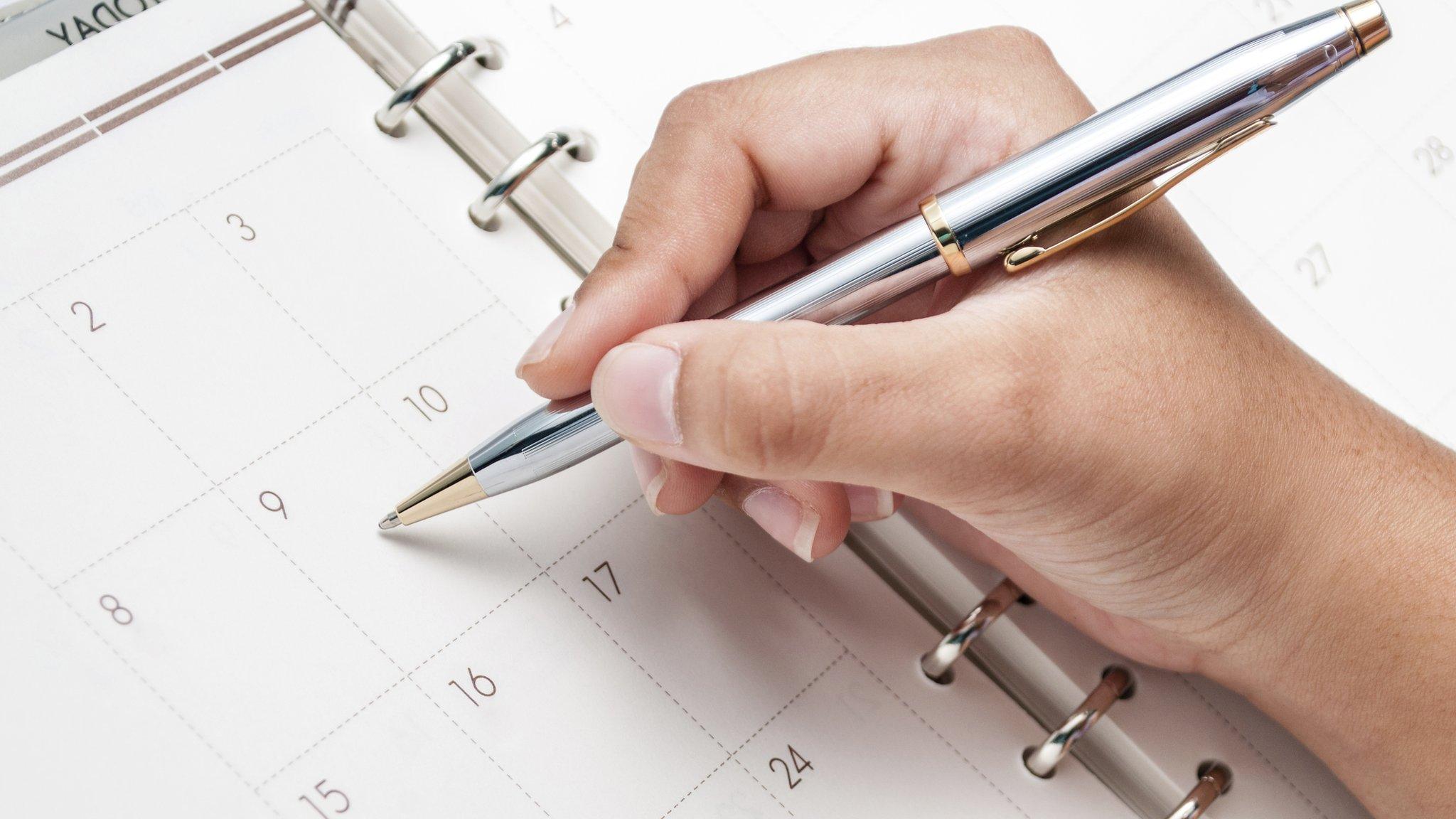
- Published8 May 2015
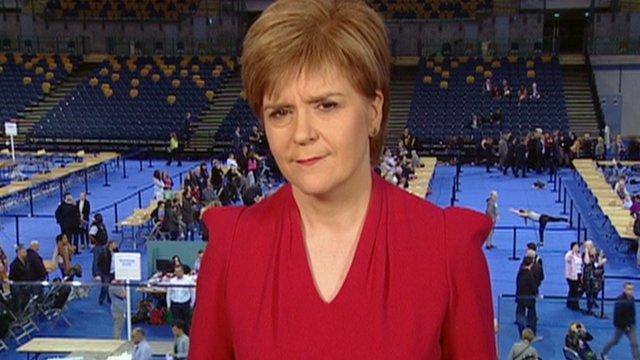
- Published8 May 2015